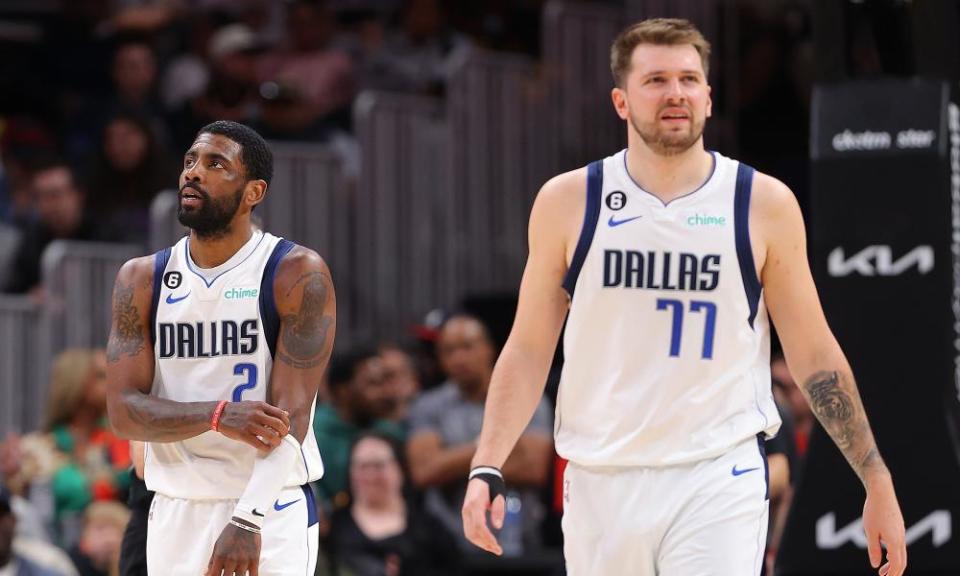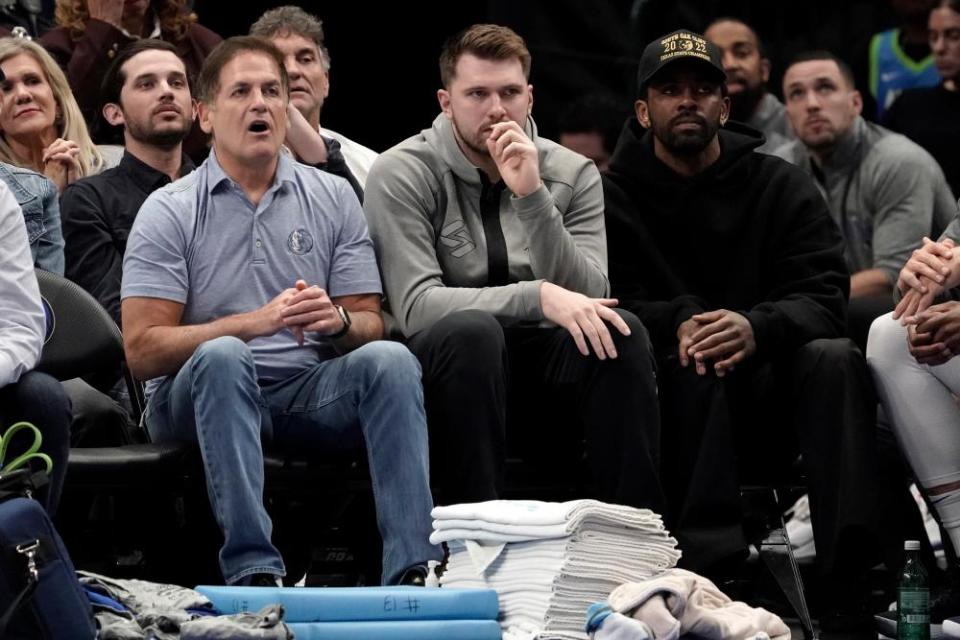How the Mavericks went from the NBA’s final four to national punchline

After committing one of the most egregious tank jobs in NBA history on Friday, the Mavericks have set the stage for Luka Dončić to leave the franchise within the next two years. No sooner had Dallas waved the white flag and sat five key players in game they had to win in order to keep their playoff hopes alive did NBA commissioner Adam Silver open an investigation into the Mavericks’ desperate, transparent attempt to hold onto their first-round draft pick this year.
How did the Mavs, less than 12 months removed from the doorstep of the NBA finals, become the biggest poverty franchise in the entire league?
Related: Mavericks eliminated from playoff race after sitting players in must-win game
Last year, as Dallas were battling the Golden State Warriors in the Western Conference finals, their impending fall from grace may have seemed hard to predict, but the signs were everywhere if you looked. It was the Mavs’ best year since their 2011 championship season – what surely will go down as the height of the Dončić era – as their Slovenian star was adding to his legacy as a generational talent and future all-time great seemingly by the night. But one couldn’t help but peer through the smoke and mirrors into their bleak cap, contract and free-agency future.
Fast-forward to today and things in Dallas couldn’t be more diametrically opposed to last spring’s feelgood playoff run. Clearly in retrospect, it was fool’s gold: the Mavs were never as good as they thought they were. After missing the play-in tournament entirely in humiliating fashion over the weekend, the Mavs have finished with a losing record for the first time since Dončić’s rookie year. What does it all mean? That their doomsday clock has accelerated to midnight: It’s no longer a question of if the Mavericks will lose Dončić, but when.
So how did they get here? Many Mavs fans, drunk on delusion, will point the finger at former general manager Donnie Nelson for assembling a weak roster around Dončić. Others will blame the former shadow GM, Haralabos ‘Bob’ Voulgaris, who botched the 2020 draft by selecting Josh Green over hometown hero Desmond Bane out of TCU. Voulgaris is also known for running Nelson and beloved coach Rick Carlisle out of town, with reports indicating Dončić hated him, too.
Those two certainly shoulder their share of the blame for where the organization finds itself today. But they have both been gone for more than two seasons. To chart how the Mavs are on the verge of losing Dončić, you must point toward who are occupying the leadership roles now.
Let’s start with owner Mark Cuban. I’ve critiqued Cuban for consistently constructing a whiter-than-average roster around back-to-back white superstars. But it goes deeper than that. First, there are the rampant sexual misconduct allegations chronicled over the past two decades. That alone has sunk them into ignominy, as no other team has had allegations, at every leadership level, levied against them to this degree. Not even the Phoenix Suns can claim controversies around their owner, president, general manager and head coach. It’s like hitting the misconduct superfecta.
On the court, Cuban has been responsible for hiring a former shoe salesman in Nico Harrison, who had zero NBA front-office experience, and Jason Kidd, who was twice fired and loathed by both former fan bases he used to preside over. Those are Cuban’s hires. This duo was apparently a package deal, and what a package they have been. Kidd has quickly become the worst coach in the NBA. And like Bucks and Nets fans before them, Mavs fans have turned on their head coach, organizing “Fire Kidd” chants in the arena. In their second season together as the team’s leaders, the Mavericks unsurprisingly find themselves on the outside of the NBA’s expanded postseason looking in.

Compounding that catastrophe was the loss Jalen Brunson, for which Cuban and Harrison share the blame. Losing an All-Star-caliber point guard right before they reach their next level is classic Cuban. He did it with Steve Nash in 2004, refusing to pay him what he was worth. Sound familiar? Harrison had three opportunities to re-sign Brunson to an affordable extension and blew it on all three attempts. By the time the summer and free agency hit, he left for a team that showed him in every way possible he was wanted. After he was drafted in 2018, Nelson declined to add a team option for the fourth year, allowing Brunson to hit the restricted free-agency market in 2021. Instead, he received a straight four-year deal, enabling him to be an unrestricted free agent last summer. Harrison saw the debacle Nelson started and said hold my beer. He had multiple opportunities to sign Brunson to a four-year, $56m extension within the last year and declined both times.
Related: ‘Just give him the ball’: the unsinkable Luka Dončić and the hope of audacity
In doing so, he signaled to Brunson he wasn’t wanted, opening the door for him to look elsewhere for appreciation. By the time free agency started, the Knicks had cleared the necessary cap space to sign Brunson outright without sending the Mavs anything in a sign-and-trade. With the Knicks, Brunson has emerged as a superstar, averaging career highs across the board, including 24 points a night with 13 30-point games and four 40-point games this season, helping the Knicks reach the fifth seed in the East. (Notably, Brunson had three 30-point and zero 40-point games in his entire time with the Mavs.)
Harrison has proven incompetent in his feeble attempts to make up for the Brunson blunder. He traded a first-round pick for Christian Wood, a player Kidd hated from the jump when he told the media in pre-season Javale McGee would start at center. Kidd has benched Wood to finish games and seems disgusted with his defensive effort. He likely walks for nothing this summer, opting for a team that will give him a chance to start. He also traded an unprotected 2029 first-round pick, starting point guard Spencer Dinwiddie and glue guy/best defender Dorian Finney-Smith for Irving. The defense was not great before the deal. Post-trade, it’s abysmal.
You can usually tell how casual a Mavs observer someone is by hearing them talk about the team’s issues. Dončić and Irving have not been a great pairing, but are not responsible for the team’s current situation. Sure, both could and should be better on defense by this point in their careers, and Dončić has been worse than ever at staying in shape and whining to the refs, but the real issue is how this roster was put together. The team is currently third-worst in the NBA in assists per game. Neither Brunson nor Dončić makes the other better when they share the court. The offense has devolved into each star watching the other take turns in isolation sets, as the Mavs has become the second-highest isolation team in the NBA.
But Irving is not the cancer the media makes him out to be. Individually, he’s been excellent in Dallas, averaging 26.7 points, 5.9 assists, 5.1 rebounds and a career-low 1.8 turnovers. He is the only player in history to record over 275 points, 60 assists and 50 rebounds in his first 10 games with a franchise, having now done it twice. But he is not the best compliment positionally or skillset-wise for Dončić, who needs a big, athletic wing next to him and a rim-rolling defensive anchor more. In addition, Irving has signaled he wants a $50m-per-year contract this summer. That would eat up almost all of the Mavs’ incoming cap space. It’s hard to imagine the future would be any better than the present. If Irving re-signs, they will not have the available salary cap to fix their roster holes: rim-protecting center, defensive wings and a tertiary ball-handler. If he walks, he will be the second star-level talent in Dallas to do so in back-to-back summers. When gambling on Irving as your second star, it’s a lose-lose scenario. They can’t fix their roster holes if the Mavs re-sign him at his desired pay. So they either let him walk for nothing or trade him for a guaranteed lesser talented player than Irving. Moves made out of desperation rarely work out.
One must wonder how Dončić, who has given the Mavericks everything he has over five seasons, feels while he watches Harrison, Cuban and Kidd fumble every move they make. If he’s smart, he’ll look after himself sooner rather than later. He’s already got the bag from Cuban by signing his max extension in 2021. He’s achieved individual success, dragging his lowly teammates to the unlikeliest of West finals appearances. But to prioritize real, consistent winning, he has to escape the institutional poverty of the only NBA team he’s known.

